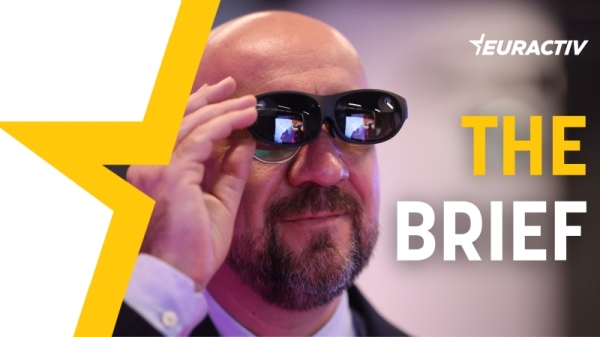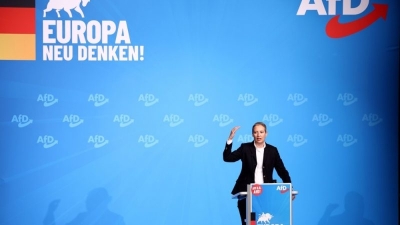The Brief – The name is Bond, European defence bond

It looks like despite political infighting, the US Senate will unlock its $60-billion military aid package to Ukraine as it fights Russian aggression.
But the EU should see these hesitations across the Atlantic as a clear message that one day soon, our Union should be able to extinguish the fire at its borders with its own means.
Individual countries cannot but the EU can: Just as Baron Munchausen pulls himself out of a mire by his hair, the EU is able to raise large amounts of money out of nowhere.
This miracle happened during the eurozone crisis when the EU created a legal instrument, the European Financial Stability Facility, able to issue bonds and with a lending capacity of €440 billion.
And with the COVID pandemic, the miracle was repeated as the EU adopted a recovery fund with a firepower of €750 billion, financed through common debt issuance.
The same line of thinking has inspired politicians to imagine defence bonds – to finance a major boost of the EU’s defence capabilities, after years of neglect when it was assumed that war was a thing of the past or that Uncle Sam would always come to the EU’s defence.
Estonia’s Prime Minister Kaja Kallas highlighted in December the need for EU defence bonds to fight Russia’s aggression in Ukraine.
This largely coincided with an important message by European Council President Charles Michel, who said the EU should consider ‘European defence bonds’ to fund investment in European defence and security as part of a new push for deeper military coordination.
Speaking at the European Defence Agency annual conference on 30 November, Michel said EU member states should pool what could amount to €600 billion in defence investment over the next 10 years.
He also said European defence bonds would be an attractive asset class, including for retail investors. Incidentally, a top European Investment Bank cautioned in an interview with Euractiv in January that investors don’t currently have an appetite for defence-related financial assets.
A couple of weeks later, French President Emmanuel Macron returned to the topic, telling investors at the World Economic Forum in Davos that Europe should resort to joint debt to finance its priorities, including defence.
Macron’s message came just days after EU Internal Market Chief Thierry Breton called on the EU to be “ready to take risks” to boost defence production, including through public co-financing.
And in January, Breton flew to Tallinn where he thanked Kallas for launching the idea of eurobonds for defence.
Michel doubled down by calling for a real defence union at the European Investment Bank’s (EIB) annual forum in Luxembourg on 7-8 February, where defence topped the agenda, marking a shift from the bank’s usual climate-focused approach.
In the European Parliament, a prominent advocate of eurobonds for defence is former Belgian prime minister Guy Verhofstadt.
Although the individual positions of member states are not known, overall, it looks like the idea of eurobonds for defence has wind in its sails.
In the run-up to the European elections, while Vladimir Putin’s propaganda makes efforts to create the impression that Ukraine is losing the war, nothing can have a more positive impact than the announcement that Europe is giving itself the capacity to become a real superpower.
Is Michel putting the decision on the agenda of the 21-22 March EU summit? He should.
The Roundup
The pro-government majority in the French National Assembly was thrown into uncertainty late on Wednesday as a key centrist ally to French President Emmanuel Macron slammed the door to future cooperation.
With the US still failing to unblock aid for Ukraine, German Chancellor Olaf Scholz stressed on Thursday that both Brussels and Washington must do more to send a “very clear signal” to Russia’s Vladimir Putin.
The European Commission on Thursday dismissed reports that it was considering sanctioning US right-wing commentator Tucker Carlson over his controversial interview with Russia’s President Vladimir Putin.
Russia’s Central Election Commission on Thursday expectedly disqualified the only anti-war candidate in the presidential election, Boris Nadezhdin, due to multiple errors in the signatures he collected supporting his nomination.
Negotiators from the European Commission, Council and Parliament struck a deal on the Platform Work Directive – for the second time – on Thursday, with all eyes now on member states, who have been asked to rubberstamp it on Friday.
Meta and TikTok confirmed they are suing the European Commission over an annual supervisory fee that companies listed under the EU’s Digital Services Act must pay.
The European Parliament adopted on Thursday its position on the controversial Prüm II regulation, a Commission proposal for automated data exchange for police cooperation, despite concerns by the EESC, political parties, and civil society organisations.
While the German government believes its international digital policy strategy, adopted on Wednesday, will foster bargaining power on the international stage while preserving democratic values and ensuring access to the internet without censorship, experts lament the lack of concrete measures.
The German government plans to support local tech start-ups with €1.75 billion but experts point out the envisaged funding would be a drop in the ocean, given that Germany is lagging far behind internationally in this field.
In an exclusive interview with Euractiv, European Parliament President Roberta Metsola said she supports a centrist approach to combat crises and political extremism ahead of European elections.
For a primer on how the Greens are preparing for the European elections, check out our Beyond the Byline podcast.
And for a round-up of EU election news, check out our revamped EU Elections Decoded.
Look out for…
- Informal meeting of competitiveness ministers (Internal market and industry) Thursday-Friday.
- Commission Vice-President Valdis Dombrovskis participates in Trilogue on Economic Governance Review on Friday.
- Informal meeting of ministers for development Sunday-Monday



